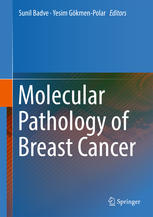آسیب شناسی مولکولی سرطان پستان ۲۰۱۶
Molecular Pathology of Breast Cancer 2016
دانلود کتاب آسیب شناسی مولکولی سرطان پستان ۲۰۱۶ (Molecular Pathology of Breast Cancer 2016) با لینک مستقیم و فرمت pdf (پی دی اف)
| نویسنده |
Sunil Badve, Yesim Gökmen-Polar |
|---|
| تعداد صفحهها |
428 |
|---|---|
| نوع فایل |
|
| حجم |
13 Mb |
| سال انتشار |
2016 |
89,000 تومان
معرفی کتاب آسیب شناسی مولکولی سرطان پستان ۲۰۱۶
چشم انداز پیچیده سرطان سینه به استراتژی های متمایزی برای مدیریت زیرگروه های مولکولی مختلف این بیماری نیاز دارد. پیشرفت های سریع در زمینه زیست شناسی مولکولی برای دست اندرکاران مطالعه و مدیریت آن گیج کننده بوده است. هدف آسیب شناسی مولکولی سرطان پستان، پر کردن این شکاف دانش با بحث جامع در مورد تکامل، مبانی بیولوژیکی و کاربردهای بالینی با تمرکز بر “چه، چه زمانی و چگونه” از مهمترین نشانگرهای مولکولی شناخته شده تا به امروز است. این نشانگرها در زمینه پروفایل های ژنومی، رونویسی و پروتئومی ارزیابی می شوند که بخشی جدایی ناپذیر از عمل پزشکی دقیق هستند.
کاربرد توالی یابی نسل بعدی (NGS) بینش جدیدی را در مورد تنظیم ساختار و عملکرد ژنومی و رونویسی ارائه کرده است. تغییرات در DNA مانند جهش ها و پلی مورفیسم های تک نوکلئوتیدی (SNPs) با پیامدها مرتبط بوده و رویکردهای درمانی جدیدی ارائه می دهند. این تجزیه و تحلیل های NGS همچنین مشارکت گسترده مکانیسم های اپی ژنتیکی مانند تغییرات هیستون، RNA های غیر کدکننده و پیوند جایگزین را نشان داد. همه این تغییرات با هم به تغییرات در پروتئین ها کمک می کنند. سنجش های جدیدتری که به ثبات و ثبات تحلیلی بیشتر اجازه می دهند در حال ظهور هستند. این تغییرات در پروفایل تومور اکنون از طریق تکنیک های تصویربرداری نیز قابل تشخیص است.
ناهمگنی تومور و ریزمحیط تومور، که یک واقعیت اجتناب ناپذیر است، به تفصیل با تمرکز ویژه بر CSCها و سیگنالینگ ایمنی مورد بحث قرار گرفته است. فصلی به فناوری نوظهور «بیوپسی مایع» اختصاص یافته است که رویکرد جدیدی را برای پایش «مستمر» سرطان که ممکن است بهتر از تشخیص های سنتی باشد، باز می کند.
«آسیب شناسی مولکولی سرطان پستان» تور سریع و آسان، نه به ذکر ضروری، برای پزشکان، آسیب شناسان و دانشمندانی که به دنبال درک ادغام زیست شناسی مولکولی در تشخیص، پیش آگهی و درمان سرطان سینه هستند.
The complex landscape of breast cancer requires distinct strategies for the management of various molecular subtypes of this disease. Rapid advances in the field of molecular biology have been bewildering for those involved in its study and management. “Molecular Pathology of Breast Cancer” aims to close this knowledge gap by discussing comprehensively the evolution, biological basis and clinical applications with a focus on the “what, when, and how” of the most significant molecular markers known to date. These markers are evaluated in the context of genomic, transcriptomic and proteomic profiles, which is integral to the practice of precision medicine.
The application of next generation sequencing (NGS) has provided new insights in the regulation of genomic and transcriptomic structure and function. Alterations in DNA such as mutations and single nucleotide polymorphisms (SNPs) have been correlated with outcomes and provide for novel therapeutic approaches. These NGS analyses have also revealed the extensive contributions of epigenetic mechanisms such as histone modifications, non-coding RNA and alternative splicing. All of these changes together contribute to alterations in proteome. Newer assays that allow greater stability and analytical consistency are emerging. These alterations in tumor profiles can be also now detected by imaging techniques.
The heterogeneity of both tumor and tumor microenvironment, an inevitable reality, is discussed in detail with particular focus on cancer stem cells and immune signaling. A chapter is dedicated to the emerging technology of “liquid biopsy”, which opens a novel approach for “continuous” monitoring of cancer that might be superior to conventional diagnostics,
“Molecular Pathology of Breast Cancer” provides a quick and easy, not to mention essential, tour for clinicians, pathologists and scientists who are seeking to understand the integration of molecular biology into the diagnosis, prognosis and management of breast cancer.



